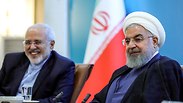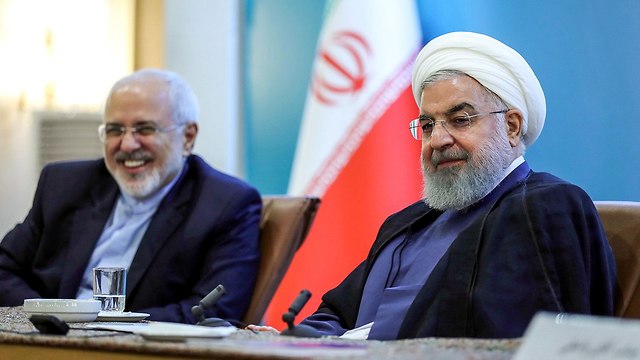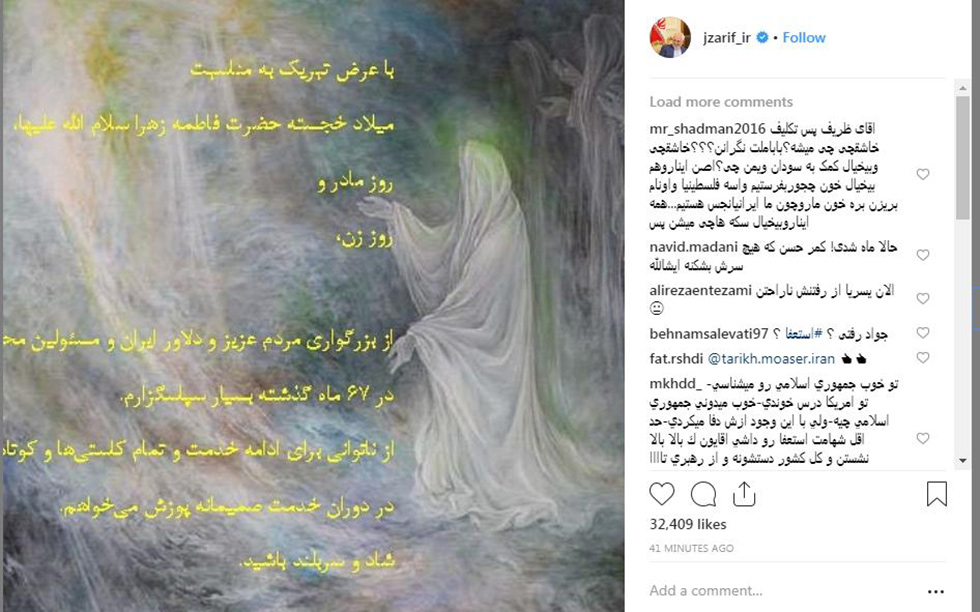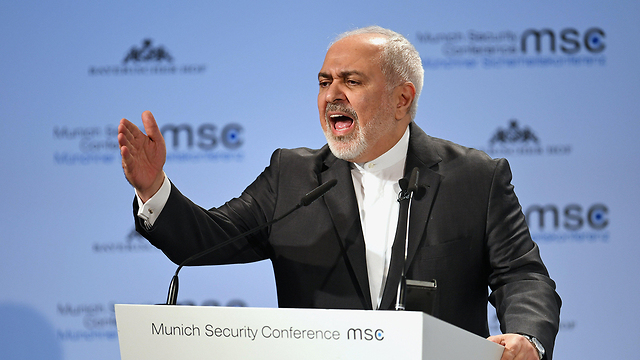
Iran's Rouhani rejects resignation of foreign minister Zarif
President Rouhani says accepting Zarif's resignation would be 'against national interests'; Revolutionary Guards commander Qassem Soleimani also expresses support of Zarif; the Iranian FM thanks Iranians for their support on Instagram.
Iranian President Hassan Rouhani rejected on Wednesday the resignation of Foreign Minister Mohammad Javad Zarif, standing by a moderate ally long targeted by hardliners in internal factional struggles over a 2015 nuclear deal with the West.
Zarif, the US-educated veteran diplomat who served as the architect of the pact which curbed Iran's nuclear program in exchange for sanctions relief, announced it on Instagram on Monday.
"As the Supreme Leader has described you a 'trustworthy, brave and religious' person in the forefront of resistance against widespread US pressures, I consider accepting your resignation against national interests and reject it," Rouhani said in a letter published on state news agency IRNA.
On Tuesday, Prime Minister Benjamin Netanyahu, welcomed Zarif's departure. "Zarif is gone, good riddance. As long as I am here Iran will not get nuclear weapons," he wrote in Hebrew on Twitter.
Rouhani cited that Israeli response in his support of Zarif. "The happiness and rejoicing of the real enemies of the people such as the Zionist regime over your resignation is the best indication of success of Mohammad Javad Zarif and the biggest reason for continuation of your activity in the post of foreign minister," Rouhani said.
In another show of confidence, senior Revolutionary Guards commander Qassem Soleimani said Zarif was the main person in charge of Iranian foreign policy and he was supported by the Supreme Leader, Ayatollah Ali Khamenei.
On Wednesday, Zarif thanked Iranians for their support. "As a modest servant I have never had any concern but elevating the foreign policy and the status of the foreign ministry," he added in an Instagram post.
After Rouhani's announcement, the semi-official ISNA news agency reported that Zarif had attended a ceremony to welcome Armenia's prime minister to Tehran.
Zarif gave no reason for his decision to quit. One of his allies said his resignation was motivated by criticism of the nuclear agreement, which has come under increasingly intense fire in Iran since the United States abandoned it last year.
"There were closed-door meetings every week, where top officials were bombarding him with questions about the deal and what will happen next and so on," a Zarif ally told Reuters on condition of anonymity. "He and his boss (Rouhani) were under a huge amount of pressure."
Since the United States walked out of the nuclear deal and reimposed sanctions last year, Rouhani has had to explain why Iran has continued to abide by its restrictions while reaping virtually none of the foreseen economic benefits.
On Tuesday, Rouhani signalled his support for Zarif by saying he had been at the forefront of the fight against America, in comments reported by state news agency IRNA. Lawmakers representing the majority moderate faction sent Rouhani a letter asking him to keep Zarif on, IRNA reported.
Rouhani's chief of staff Mahmoud Vaezi said Rouhani stood by Zarif. The president's praise was "a clear sign of the satisfaction of the representative of the people of Iran about the wise and effective positions and work of Dr Zarif," Vaezi wrote on Instagram.
The schism between hardliners and moderates over the nuclear deal shows the tension in Iran between the two factions, and between the elected government which runs the country on a day-to-day basis and a clerical establishment with ultimate power.
Rouhani won landslide elections in 2013 and 2017 on promises of reform, while Supreme Leader Ayatollah Ali Khamenei, in power since 1989, is seen as above factional fighting but sympathetic to the hardliners. Although Rouhani is responsible for choosing ministers, Khamenei traditionally has the last say.
"If he (Khamenei) publicly backs Zarif and Rouhani, this crisis will be over in a good way and it will narrow the gap between different political camps in the country," said an official.
The political uncertainty comes at a difficult time for Iran's leaders as the newly reimposed US sanctions have dashed hopes of an economic breakthrough. Rouhani has warned that the country is facing the worst economic crisis in 40 years.
Hardships have triggered waves of nation-wide protests, with calls for both Rouhani and clerical leaders to step down.
The Associated Press contributed to this story.













